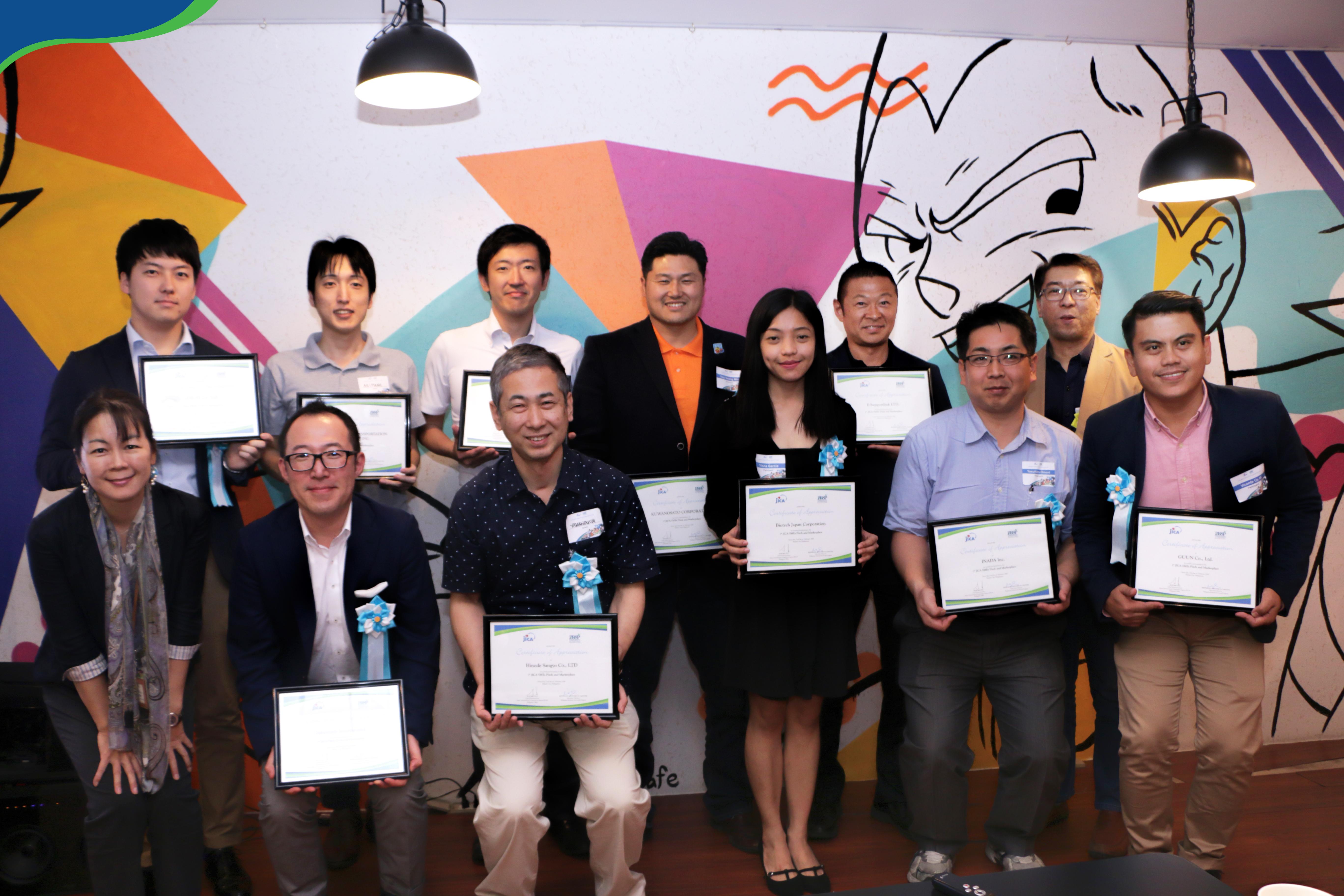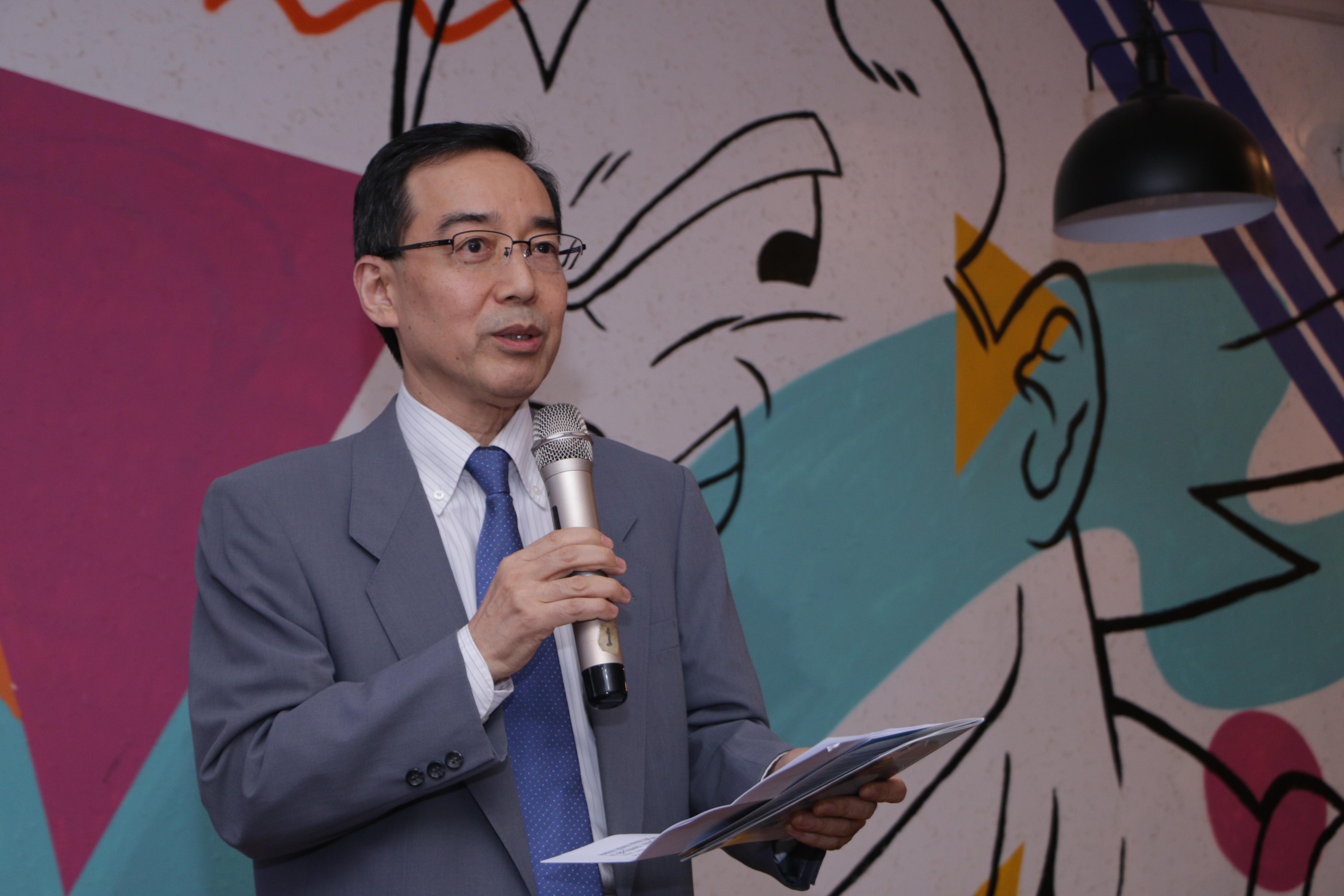Japanese SMEs bring innovation to PH

INNOVATIONS FOR PH—Japanese small and medium enterprises (SMEs) show their certificates of recognition after presenting their technologies before the Philippine business community, local government units, and potential investors during the JICA SMEs Pitch and Marketplace organized by the Japan International Cooperation Agency (JICA), in partnership with Philippine Business for Social Progress (PBSP). In photo are (front row from left) Ayumu Ohshima, Senior Representative of JICAPhilippines, Noriaki Ishibashi of Informatix Inc., Hiroshi Yamanouchi of Hinode Sangyo Co., Ltd., Trisha Garcia of Biotech Japan, Yasuhiro Omori of Inada Inc., Vicente Uy III of Guun, (back row from left) Nick Sakai of eTRUST Co., Ltd., Akifumi Omoto of Bemac Electric Transportation Philippines, Inc., Tomoharu Wakita of Iseki Poly-tech, Inc., Kuwanosato Japan President Han Seong Min, Terry Kawashima of E-supportlink Ltd., and PBSP Office of Strategy Management, Procurement and Information Technology Director Felix Tonog.

Susumu Ito, Chief Representative of the Japan International Cooperation Agency (JICA) Philippine Office shares how Japanese innovations have helped in addressing various development challenges in the Philippines during his opening speech at the JICA SMEs Pitch and Marketplace organized by JICA, in partnership with Philippine Business for Social Progress.
In an effort to help solve pressing development challenges and boost Japanese private sector participation in the Philippines, 10 small and medium enterprises (SMEs) from Japan showcased their technologies before representatives from the Philippine government and the business community.
Organized by the Japan International Cooperation Agency (JICA), in partnership with Philippine Business for Social Progress (PBSP), the 1st JICA SMEs Pitch and Marketplace was held recently in Makati City.
The pitch event is part of JICA’s partnership with the private sector that encourages Japanese companies with technological expertise to support the development needs of JICA partner-countries. Participants for the event have been in the Philippines to perform feasibility studies or pilot test their technologies.
“Since our company is small, we could not promote ourselves in the Philippine market without JICA’s help. This program is very good for us because we were able to research, and test our machine here in the Philippines,” said Yasuhiro Omori of Inada Inc. which introduced a portable water filtration system that can make floodwater safe to drink.
Shintaro Matsumaru of Informatix Incorporated expressed openness to partner with the other participating companies to improve their service or product delivery in the country.
He said, “It’s a great opportunity for us to have communication (networking) with other SMEs. We would like to have collaboration with them here in the Philippines.”
Other innovative products that were presented include a microbe-utilizing wastewater management system, a solid waste management system that recycles plastic wastes into viable alternative fuel for cement factories, an electric tricycle technology, trenchless tunneling machine, monitoring technology for farmers, telemetry irrigation system for efficient water use, caffeine-free mulberry tea, and protein-reduced rice for people with kidney disease.
“JICA sees this partnership with SMEs as a successful win-win model since it helps create jobs and prosperity not only in partner-countries but also in Japan. Over the years, a number of Japanese SMEs have lent their support to the Philippines. They helped provide clean water to disaster areas after Typhoon Yolanda, introduced new technology to Filipino farmers and shared a system of emergency medical recording in times of disasters. Their expertise has been useful, in one way or another, in transforming the lives of Filipino communities they serve,” said JICA Philippine Office Chief Representative, Susumu Ito.
Other participating SMEs include Hinode Sangyo Co., Ltd., eTRUST Co. Ltd., Kuwanosato Japan, Bemac Electric Transportation Philippines, Inc., E-supportlink Ltd., Iseki Poly-tech, Inc., Guun and Biotech Japan.
TECHNOLOGIES FOR SUSTAINABILITY
Dr. Ma. Carmen Ablan-Lagman, Biology Department professor from De La Salle University and member of the event’s panel, underscored the holistic benefits of the technologies presented at the pitch session.
“The idea that a development project resulted into the testing of a product that is really suitable for the market is very interesting. From problem identification, product design, feasibility, to the target community, it’s done within the project lifetime and results in a technology which will be then packaged for commercialization and create sustainability, jobs and revenue,” she said.
Private sector representative Darwin Flores, Vice President for Community Partnerships of Smart Communications underscored the importance of identifying problems and solutions collectively and considering the perspectives of both Japanese and Filipinos to further improve the products and processes.
“You also have to consult with industry and local players to see what the problems are, but this is a very good start and I know that there will be further improvements. I hope that they will continue,” he said.
Melanie Moleño, Program Director of the Inclusive Business Program of the Philippines’ Board of Investors (BOI) saw the possibility of applying inclusive business models among the SMEs.
She said, “The good thing about this is that we see a lot of potential for inclusive business. They can actually engage communities if they produce their products here like the mulberry tea and protein reduced rice. Although they are small-scale right now, if they go big, there is a great potential to engage local farmers.”
The event also aims to forge partnerships between the said Japanese SMEs, experts, networks and other stakeholders in the business sector.
“The cooperation between Japanese enterprises and Philippine SMEs or government agencies demonstrated a win-win proposition to evolve a business-to-business partnership in addressing development challenges. I hope that JICA will continue to pursue and even expand this program, which is very much aligned with PBSP’s thrust of promoting inclusive business,” said Felix Tonog, Director of PBSP’s Office of Strategy Management, Procurement and Information Technology and Chairman of the event’s panel.
-30-








